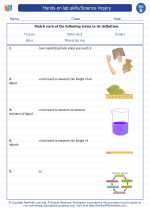Universal Solvent: Explanation
In chemistry, a universal solvent is a substance that has the ability to dissolve a wide range of different solutes. The most well-known universal solvent is water. Water is considered a universal solvent because it is capable of dissolving a variety of substances due to its unique chemical properties.
Properties of Water as a Universal Solvent:
- Polarity: Water is a polar molecule, meaning it has a slightly positive end and a slightly negative end. This allows it to interact with and dissolve other polar and ionic substances.
- Hydrogen Bonding: Water molecules can form hydrogen bonds with other polar molecules, helping to break them apart and dissolve them.
- High Dielectric Constant: Water has a high dielectric constant, which means it is very effective at separating and dispersing charged particles, making it an effective solvent for ionic compounds.
Examples of Substances Dissolved by Water:
Water can dissolve many substances, including:
- Sugar
- Salt
- Acids and Bases
- Many organic compounds
- Some gases, such as oxygen and carbon dioxide
Universal Solvent: Study Guide
Here are some key points to remember about the concept of a universal solvent:
- Definition: A universal solvent is a substance that has the ability to dissolve a wide range of solutes.
- Water as a Universal Solvent: Water is the most well-known universal solvent due to its unique chemical properties, including polarity, hydrogen bonding, and a high dielectric constant.
- Properties of Water: Water's ability to dissolve substances is due to its polarity, hydrogen bonding, and high dielectric constant.
- Examples of Substances: Water can dissolve a variety of substances, including sugar, salt, acids and bases, organic compounds, and some gases.
Understanding the concept of a universal solvent, particularly the properties of water that make it a universal solvent, is important in the study of chemistry and the behavior of substances in solution.
.◂Science Worksheets and Study Guides Second Grade. Hands-on lab skills/Science Inquiry
Study Guide Hands-on lab skills/Science Inquiry
Hands-on lab skills/Science Inquiry  Worksheet/Answer key
Worksheet/Answer key Hands-on lab skills/Science Inquiry
Hands-on lab skills/Science Inquiry  Worksheet/Answer key
Worksheet/Answer key Hands-on lab skills/Science Inquiry
Hands-on lab skills/Science Inquiry  Worksheet/Answer key
Worksheet/Answer key Hands-on lab skills/Science Inquiry
Hands-on lab skills/Science Inquiry  Vocabulary/Answer key
Vocabulary/Answer key Hands-on lab skills/Science Inquiry
Hands-on lab skills/Science Inquiry 

 Worksheet/Answer key
Worksheet/Answer key
 Worksheet/Answer key
Worksheet/Answer key
 Worksheet/Answer key
Worksheet/Answer key
 Vocabulary/Answer key
Vocabulary/Answer key

The resources above cover the following skills:
PHYSICAL SCIENCE (NGSS)
Matter and its Interactions
Students who demonstrate understanding can:
Plan and conduct an investigation to describe and classify different kinds of materials by their observable properties.
Analyze data obtained from testing different materials to determine which materials have the properties that are best suited for an intended purpose.